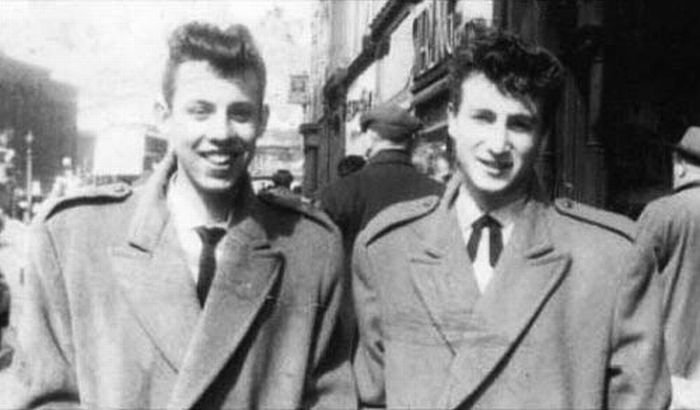|
|
History: Early Years Of The Beatles
|
Among Revolver's most experimental tracks was "Tomorrow Never Knows", for whose lyrics Lennon drew from Timothy Leary's The Psychedelic Experience: A Manual Based on the Tibetan Book of the Dead. The song's creation involved eight tape decks distributed about the recording studio building, each manned by an engineer or band member, who randomly varied the movement of a tape loop while Martin created a composite recording by sampling the incoming data. McCartney's "Eleanor Rigby" made prominent use of a string octet; it has been described as "a true hybrid, conforming to no recognizable style or genre of song." Harrison was developing as a songwriter, and three of his compositions earned a place on the record. In 2003, Rolling Stone ranked Revolver as the third greatest album of all time. During the US tour that followed, however, the band performed none of its songs. As Chris Ingham explains, they were very much "studio creations ... and there was no way a four-piece rock 'n' roll group could do them justice, particularly through the desensitising wall of the fans' screams. 'Live Beatles' and 'Studio Beatles' had become entirely different beasts." The final show, at San Francisco's Candlestick Park on 29 August, was their last commercial concert. It marked the end of a four-year period dominated by touring that included over 1,400 concert appearances internationally.
Freed from the burden of touring, the band's desire to experiment grew as they recorded Sgt. Pepper's Lonely Hearts Club Band, beginning in December 1966. Recording engineer Geoff Emerick recalled their insistence "that everything on Sgt. Pepper had to be different. We had microphones right down in the bells of brass instruments and headphones turned into microphones attached to violins. We used giant primitive oscillators to vary the speed of instruments and vocals and we had tapes chopped to pieces and stuck together upside down and the wrong way round." Parts of "A Day in the Life" required a forty-piece orchestra. Nearly seven hundred hours of studio time were devoted to the sessions. They first yielded the non-album double A-side single "Strawberry Fields Forever"/"Penny Lane" in February 1967; Sgt. Pepper followed in June. The musical complexity of the records, created using only four-track recording technology, astounded contemporary artists. For Beach Boys leader Brian Wilson, in the midst of a personal crisis and struggling to complete the ambitious Smile, hearing "Strawberry Fields" was a crushing blow and he soon abandoned all attempts to compete. Sgt. Pepper met with great critical acclaim. In 2003, Rolling Stone ranked it number one among its "500 Greatest Albums of All Time" and it is widely regarded as a masterpiece. Jonathan Gould describes it as
a rich, sustained, and overflowing work of collaborative genius whose bold ambition and startling originality dramatically enlarged the possibilities and raised the expectations of what the experience of listening to popular music on record could be. On the basis of this perception, Sgt. Pepper became the catalyst for an explosion of mass enthusiasm for album-formatted rock that would revolutionize both the aesthetics and the economics of the record business in ways that far outstripped the earlier pop explosions triggered by the Elvis phenomenon of 1956 and the Beatlemania phenomenon of 1963.
Sgt. Pepper was the first major pop album to include its complete lyrics, which were printed on the back cover. Those lyrics were the subject of intense analysis; fans speculated, for instance, that the "celebrated Mr K." in "Being for the Benefit of Mr. Kite!" might in fact be the surrealist fiction writer Franz Kafka. The American literary critic and professor of English Richard Poirier wrote an essay, "Learning from The Beatles", in which he observed that his students were "listening to the group's music with a degree of engagement that he, as a teacher of literature, could only envy." Poirier identified what he termed the "mixed allusiveness" of the material: "It's unwise ever to assume that they're doing only one thing or expressing themselves in only one style ... one kind of feeling about a subject isn't enough ... any single induced feeling must often exist within the context of seemingly contradictory alternatives." McCartney said at the time, "We write songs. We know what we mean by them. But in a week someone else says something about it, and you can't deny it. ... You put your own meaning at your own level to our songs". Sgt. Pepper's remarkably elaborate album cover also occasioned great interest and deep study. The heavy moustaches worn by the band swiftly became a hallmark of hippie style. Cultural historian Jonathan Harris describes their "brightly coloured parodies of military uniforms" as a knowingly "anti-authoritarian and anti-establishment" display.
|
|









